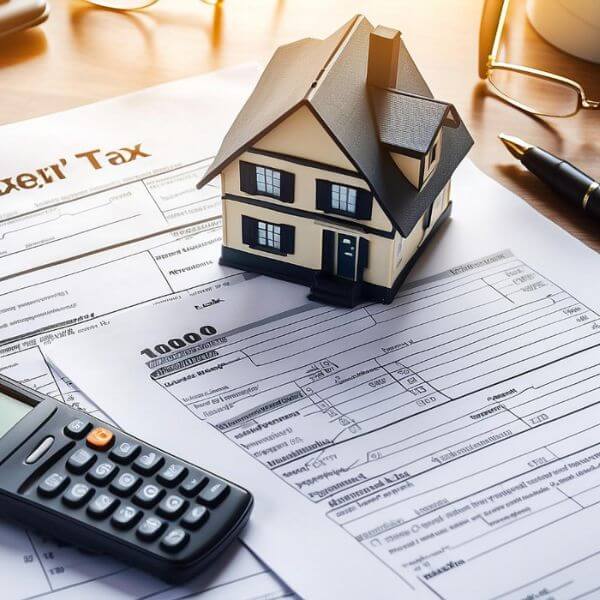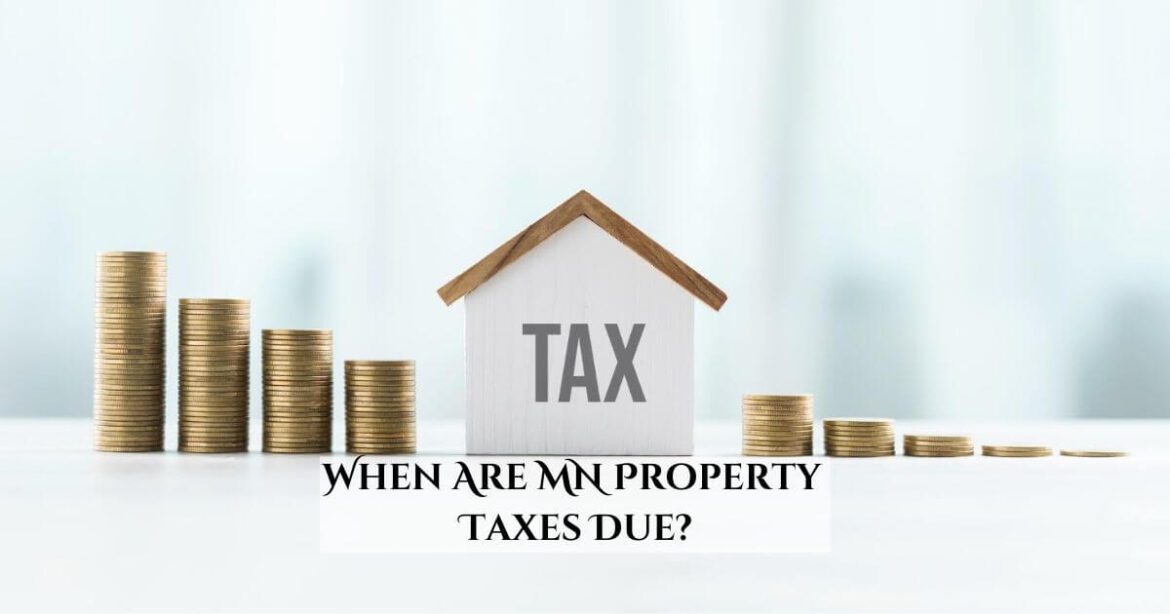Last Updated on January 2, 2026 by Amrita Das
In the state of Minnesota, property taxes are an important source of revenue for local governments. These taxes fund necessary services such as schools, roads, and public safety. If you own a property in Minnesota, it is important to know when your property taxes are due.
Missing the tax deadline can result in late fees and penalties, which can add up quickly. However, in this article, I will discuss when are MN taxes due and what happens if you miss the deadline.

Read More: Does Section 8 Look at Tax Returns? What You Need to Know
When Did Property Tax Start In Minnesota?
Property tax in Minnesota has a long history, beginning even before the state itself was established. In 1849, nine years before Minnesota became a state, the first territorial assembly implemented a property tax levy for the purpose of supporting schools.
This means that property owners in Minnesota have been paying taxes on their properties for over 170 years. This early establishment of property tax highlights its importance in the state’s economy and the priority placed on education by early lawmakers.
Over the years, Minnesota’s property tax system has evolved and undergone various changes, but it remains a crucial source of revenue for funding local government services.
When Are MN Property Taxes Due?
Understanding Your Property Tax Statement
Before going into the deadlines for property tax payments, it is essential to understand your property tax statement. This document provides a breakdown of how your taxes are calculated, the amount due, and the deadline for payment.
Your property tax statement is usually sent to you by your county’s treasurer or auditor, and it contains valuable information that will help you better understand your taxes.
Due Dates For Property Taxes
In Minnesota, property taxes are usually due twice a year on May 15 and October 15. If these property tax due dates fall on a weekend or holiday, you will receive your deadline until the next business day.
It is important to note that failure to pay property taxes by the designated due date can result in penalties and interest charges. The May 15th deadline covers the first half of the year, while the October 15th deadline covers the second half.
This means that when you receive your property tax statement, it will cover a six-month period and have a due date of either May or October.
How Is Property Tax Calculated In Minnesota?
Property taxes in Minnesota are based on the value of your property and the tax rate set by your local government. The value of your property is determined by a county assessor who conducts a market analysis and assesses the value of your home.
This value is then multiplied by the tax rate to determine your property tax bill. The tax rate for each jurisdiction (city, county, school district) is set by their respective governing bodies and can vary from year to year.
This means that your property taxes may change each year depending on the changes in tax rates.
What Happens If You Miss The Deadline? Consequences Of Late Payment
If you miss the deadline for filing and paying your taxes, it could end up costing you more money in penalties and interest. The amount of penalty you will have to pay depends on the type of penalty incurred, such as a late filing or late payment penalty.
For example, if you do not pay your taxes by April 15th, then an additional 4% of the tax not paid will be added as a penalty. This percentage increases if you still have not paid after 180 days.
Additionally, if you fail to file your return by October 15th, then a 5% penalty will be added on top of any taxes owed. For taxpayers who underpaid their estimated taxes, there is also a penalty that can be determined by filling out Schedule M15.
It is important to note that these penalties can be abated, or canceled if you have a reasonable cause for not filing or paying on time.
However, if the Tax Revenue Department determines that your failure to pay was due to negligence or intentional disregard of the law, then a 10% penalty will be added on top of any additional tax assessed.
It is always best to file and pay your taxes on time to avoid these costly penalties and interest charges.
MN Property Tax Payment Options
Now that you know when your property taxes are due, how it is calculated, and the consequences of late payments, it is essential to understand the various payment options available to you.
The most common payment methods in Minnesota include:
- Paying online through your county’s website
- Mailing a check or money order to your county’s treasurer or auditor
- Setting up automatic payments through your bank
- Paying in person at your county’s government center
It is important to note that each county may have its own specific payment methods, so it is crucial to check with your county’s treasurer or auditor for more information.
Benefits Of Online Property Tax Payment In Hennepin County, Minnesota

Paying property taxes online in Hennepin County, Minnesota offers numerous benefits to taxpayers. By utilizing the secure and convenient online payment options, you can save time and effort while ensuring timely payment of your property taxes.
Here are some key advantages of using the online payment method:
Flexible Payment Options
Hennepin County’s online tax payment system allows you to pay current year taxes from March through December, prior year taxes at any time during the year, and proposed future taxes from mid-November through February.
This gives you greater flexibility in managing your tax payments.
Quick Processing Time
Online payments are considered paid on the date they are submitted, eliminating the need to wait for bank posting. You can view your payment status within 3 business days, giving you peace of mind that your taxes are paid on time.
Secure And Convenient
Hennepin County’s online tax payment system offers a secure platform for making payments. Whether you choose to pay by e-check, credit card, debit card, PayPal or Venmo, all transactions are processed through a secure portal, ensuring the safety of your personal and financial information.
Higher Transaction Limits
Unlike traditional methods where there may be limits on how much you can pay at once, Hennepin County’s online payment system allows for higher transaction limits.
E-checks have a $50,000 limit per transaction while all other options have a $25,000 limit. If you owe more than these amounts, you can simply submit multiple online payments.
No Additional Fees For E-check Payments
Paying your property taxes through e-check is completely free of charge. This means you won’t have to pay any additional fees on top of your tax amount, making it a cost-effective option for taxpayers.
Acceptance Of Various Payment Methods
Hennepin County’s online payment system accepts various forms of payment, including Visa, MasterCard, American Express and Discover credit cards, as well as debit cards linked to these networks.
You can also use PayPal or Venmo through the online portal for added convenience.
Transparency in Fees
The county adheres to state law by passing on any fees charged by credit card companies to the taxpayer. This means we don’t receive any portion of the fee and only collect the property tax amount.
Visa debit cards incur a flat fee of $2.95 per invoice, while all other payment methods have a 2.29% service fee.
Additional Reading: Do Churches Pay Property Tax? Discover Everything
Other Payment Methods Available For Property Taxes
Aside from the traditional methods of paying property taxes such as by mail, in person, or through drop boxes, Hennepin County also offers other convenient options for taxpayers to make their payments.
These methods include over-the-phone, direct debit, bill pay, and escrow.
- Over the phone: Taxpayers can make a payment over the phone by calling the Paymentus automated phone system at 1-877-626-0017.
- Direct debit: This method allows taxpayers to sign up to have their property tax payments automatically withdrawn twice a year from their checking or savings account.
- Bill pay: Taxes can also be paid through a taxpayer’s bank using their bill pay service. However, it may take up to seven to 10 days for Hennepin County to receive the payment once requested from the bank.
- Escrow: Property taxes may also be included as part of a mortgage payment. The county sends payment information to the mortgage company or lending institution and a copy to the taxpayer. For any questions about escrow, taxpayers should contact their mortgage company or lending institution.
With these additional payment methods, taxpayers have more flexibility and convenience in paying their property taxes to Hennepin County. Additionally, it is important to note that all payments must be made by the designated due dates to avoid penalties and late fees.
How Much Is Minnesota Property Tax?
Minnesota property tax is determined by the state general levy rates set by the Minnesota Department of Revenue.
These rates are based on information gathered from PRISM submissions and are used to calculate the final commercial-industrial and seasonal residential recreational rates for taxes payable in 2024.
The commercial-industrial rate stands at 29.294%, while the seasonal residential recreational rate is set at 10.640%.
To determine these rates, the department uses the corresponding tax levies for each category, which are $716,990,000 for commercial-industrial properties and $41,690,000 for seasonal residential recreational properties.
This detailed process ensures that property taxes in Minnesota remain fair and uniform across all counties. It also highlights the importance of accurate record-keeping and data analysis in determining property tax rates.
Knowing how much your property taxes will be can help you plan and budget accordingly, making it essential to understand the factors that go into calculating them.
So, if you own property in Minnesota or are considering purchasing one, it is crucial to educate yourself on the state’s property tax system and stay updated on any changes made by the Department of Revenue.
At What Age Do You Stop Paying Property Taxes In MN?
In Minnesota, the age at which you stop paying property taxes depends on whether or not you qualify for the Property Tax Deferral for Senior Citizens. This program allows eligible individuals who are 65 and older to defer a portion of their property taxes.
If married, one spouse must be at least 65 years old while the other must be at least 62 in order to qualify.
Additionally, the household income must be $96,000 or less and the home must have been owned and lived in for at least 5 years, with homesteaded status for the same period.
It’s also important to note that there cannot be any reverse mortgages, life estates, or state/federal liens on the property, and other liens must not exceed 75% of the estimated market value.
Eligible individuals can take advantage of this program to reduce their property tax burden, making it a valuable resource for seniors in Minnesota.
Read Also: What Are MUD Taxes? | A Guide To Texas Property Taxes
When Are MN Property Taxes Due? Conclusion
Therefore, understanding when and how to pay your property taxes in Minnesota is extremely important as a property owner. Be sure to check with your local county government for specific due dates and payment options.
Staying up to date with your property taxes helps fund important services and avoids the potential consequences of not paying on time. Therefore, it is imperative to be informed and responsible as a property owner in Minnesota.
Reference Link: When Are MN Property Taxes Due
- https://www.hennepin.us/residents/property/property-tax-payment-options
- https://www.revenue.state.mn.us/penalties-and-interest-individuals
